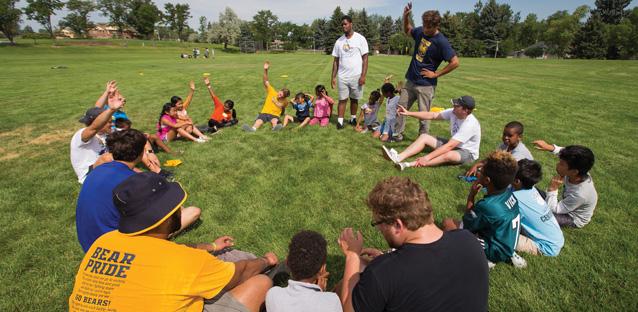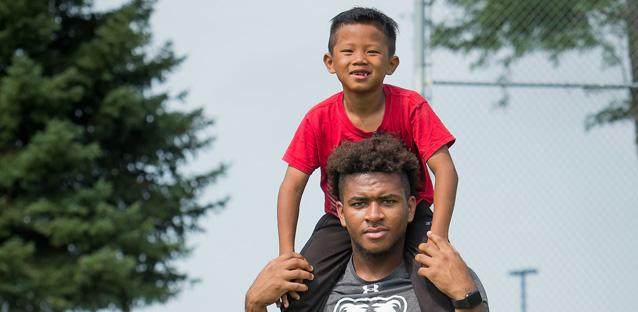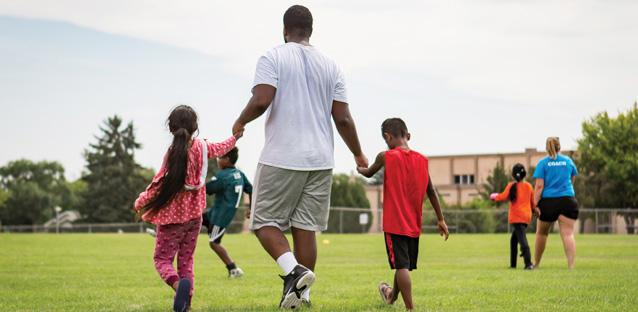Sporting New Bridges
By Rebecca Dell, Photography by Woody Myers
Soccer Without Borders Greeley is one of the bridges that helps Greeley’s refugee and immigrant population adjust to U.S. life. And thanks to a partnership with UNC, it’s also one of the ways that UNC student-athletes cross the bridge from high school to college.
It’s a warm, sunny September afternoon on some loosely defined fields near the Greeley Mall. A high school marching band practices nearby. A few young soccer coaches drag out portable nets and bags of soccer balls. Kids trickle in for practice. They’re here for Soccer Without Borders (SWB), an international nonprofit built around soccer, education and community.
On the girls’ field, Niyat, an 11-year-old from Eritrea, and Thang, a 12-year-old from Burma, chat easily together. They both started playing soccer in the past couple years. Both are oldest siblings, and they agree that it’s a lot of work and a lot of expectation. Another girl, Luluya, shows up.
Like many middle school girls, they’re excited about things like ice cream and the rare chance to try on make-up. They’re thoughtful and observant. They love their SWB family.
“We’ve experienced new things while we were here,” says Luluya, who also rattles off a slam-style poem she wrote as evidence of her future as a poet.
The girls also recognize the value of putting in work to build new skills — players join the organization with all different levels of soccer experience.
In 2018, UNC’s Office of Community and Civic Engagement launched UNC Engage, an online portal allowing community organizations to post volunteer openings for UNC students. Soccer Without Borders is one of the organizations profiled on UNC Engage, offering students the chance to connect with and serve the refugee population in Greeley.
Watch a short film “Playing for Chance” on SWB and the powerful work they are involved with.
“It makes us try, and it makes us know why there’s a point to trying,” Luluya says.
Over on the boys’ field, the team starts running a shooting drill. Teddy, a 12-year-old from Ethiopia, and Mohamed, an 11-year-old from Malaysia, step out of the drills to talk for a few minutes. They’re polite and good-humored; Mohamed plans to get his Ph.D. and become an orthopedic spine surgeon. Both have been playing soccer for years and speak multiple languages. SWB has the same draw for them that team sports have for any kid.
“You get to go to games, you get to have fun, try everything with your teammates,” Teddy says. “And score goals.”
And, every summer, they get to help incoming UNC student-athletes learn how to coach and mentor.
•••••
Back when he was a sophomore at UNC, Zach Kilimann, ’16, was looking for a job and a way to get involved. He saw an ad for SWB Greeley and, with years of soccer experience on his resume, rode his bike over one day. A group of Greeley’s refugee and immigrant kids immediately asked him if he was their new coach.
No, he remembers saying.
He continued to say no each practice for the next couple months, until one day, his answer changed to yes. After graduating with a degree in Political Science, he went on to a staff position with SWB. Today, he’s the senior program coordinator for SWB Greeley, and his personal life mirrors his commitment to the refugee families of Greeley — he and his wife, Shawna Kilimann ’15, a first-grade teacher, consistently engage with the kids in and around their apartment complex, playing soccer, baking cookies and reading books.
SWB is flexible based on the community it’s designed to serve. There are programs in Baltimore, Boston, Oakland, Seattle and cities throughout Colorado. In Greeley, soccer and other activities help students practice English, make friends and navigate U.S. culture. Ninety-five percent of SWB participants across the U.S. graduate from high school. And families build relationships with Soccer Without Borders staff, who serve as a safe resource for questions about adjusting to life in the U.S.
“It’s sort of bridging the gaps that exist in our present reality,” Kilimann says. “Those questions can only come once the families feel safe and once the kids feel at home. And so soccer provides a home where previously there wasn’t a home for them.”
•••••
Each summer for the past eight years or so, the UNC football and wrestling coaches have had their incoming players participate in a UNC Summer Bridge program, which allows them to get a certain number of summer practice hours, per NCAA rules.
Back when Coach Earnest Collins started at UNC, Jimmy Henderson, the Associate Athletic Director for Academic Success, was tasked with running the program. From the beginning, he and his team were determined to make the program more than just a tool to get athletes in the gym. They started researching other campus’ success stories and found a compelling one at Oregon State, where Athletics had tried using the typical summer classes as part of a summer bridge — English, math — but found that the content wasn’t engaging. What really got student-athletes invested, they found, was including a multicultural element.
So Angela Henderson, Ph.D., a Sociology professor at UNC, made the initial connection with SWB Greeley through one of her students, Abby Smith, the former program coordinator.
The combination of multicultural classroom and service learning content was a hit. The Athletic Department’s fall first-year GPA went from 2.47 to 3.1 in the first five years of the program, Jimmy says. But perhaps one of the best indicators of the program’s success was more human: a text message Jimmy keeps on his phone from a former UNC football player, Samad Hinds (profiled in the spring 2018 UNC Magazine), who graduated with his master’s from UNC. The text includes two photos: one of Samad with a Soccer Without Borders participant during his Summer Bridge, and one of the two when they serendipitously met after Samad graduated.
The Summer Bridge and SWB partnership may look slightly different every year — 2018 included three field days on UNC’s campus, run by the Summer Bridge participants, and the academic component of the Summer Bridge included a library research course and an interdisciplinary course called “Coming of Age” — but the impact on the UNC players is the same.
“One of the comments we typically get is it was a different experience primarily because throughout their life, they had been mentored by somebody,” Jimmy Henderson says. “This was the first time they were mentoring somebody.”
“One of my large hopes from the partnership is to see these players have a transformed perspective on their capacity to impact others,” Kilimann says.
Before this summer’s program, Kilimann and his team took the players to visit some of the SWB families. It helps them gain a better sense of the community they’ve just become a part of.
“We immediately foster a sort of joy in living in Greeley,” Kilimann says.
•••••
Those visits impacted Jaren Mitchell, a first-year wide receiver from Carrolton, Texas, who joined the Bears after a last-minute coaching change at the university where he originally planned to attend. He says visiting some of the families in their homes was eye opening — both to realize who was part of his new community, and to see their happiness despite despite the challenges they face. It forced him to consider how he would react in similar circumstances — a sentiment that Trish Jolly, the Anthropology professor who teaches the “Coming of Age” course, says has been shared before.
For Jolly, who grew up with a soccer-obsessed family in Bolivia, starting with the Summer Bridge program five years ago represented a bridge of her own; she shares with her students that she used to roll her eyes at athletes until she got to know them by teaching them. She saw their transparency, how well they connected to the class material, how they didn’t fit her stereotypes. Her unique upbringing, experiences and focus on pedagogy has proven to be a perfect fit for teaching student-athletes.
Jolly had been a talented pianist since the age of four, and she planned on a career playing piano. But when a drunk driver caused an injury that made her lose sensation in part of her left hand, she had to drastically change her plans and manage a devastating blow to her identity. So she can relate to the fragility of a career — even a college one — in sports.
“How do you foster your whole self?” she asks her students. “Have you allowed yourself to explore other angles? Because it’s a win-win. If you go on to be smashingly successful, you’ll be smashingly successful, super awesome, well-rounded. If athletics doesn’t come through for you, you’ve developed this other side of yourself fully.”
“Coming of Age” also deals with topics such as sexual assault, and Jolly says that sharing her personal experiences from Bolivia open doors for honest conversations about the sexual assault problem in America, the stereotypes that fall on them as football players and wrestlers, and what they can do to effect change.
Mitchell remembers “real-life conversations” from her class, having discussions he’d never had with a teacher before. He says the Summer Bridge program — with its academics and the time it allowed him on the field — prepared him mentally and physically for the fall semester.
“The first day of classes, you’re working with high school students,” Henderson says. “But by the last day of classes, you’re working with college students.”
•••••
And for Mitchell, the SWB field days were just a lot of fun. His main concern is that he doesn’t want to drop the new connections he formed with the community. As Kilimann says, you can’t just say “yes” to a kid once — you need to build a bridge, and then keep traveling with the kid when they get to the other side. UNC

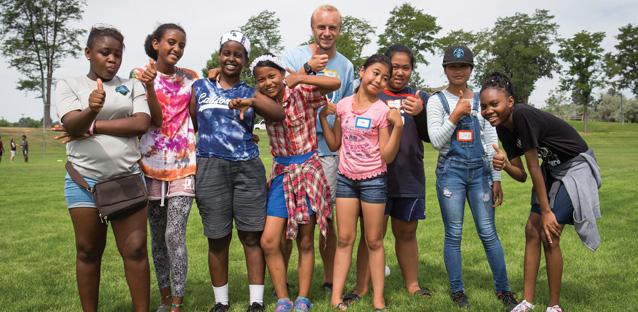
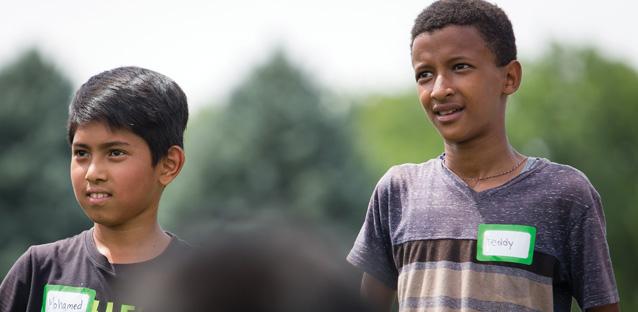
![UNC athletes share a game with SWB participants, while also building relationships. “One of my large hopes from the partnership is to see these [UNC] players have a transformed perspective on their capacity to impact others,” says Kilimann, Soccer Without Borders Greeley senior program coordinator.](https://www.unco.edu/_resources/.ldp-images/.private_ldp/a187575/production/master/ea64c38e-02a7-414b-be59-108d1145ec2f.jpg)
